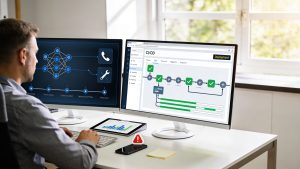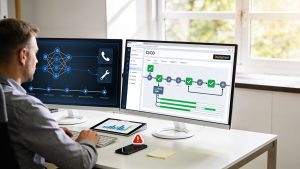Merely 35% of contemporary projects reach successful completion. The underwhelming success rate can be attributed, in part, to the limited maturity of available technologies in the field of project management. However, a transformation in this scenario is on the horizon.
According to Gartner’s research findings, it is anticipated that by the year 2030, approximately 80% of tasks related to project management will be executed by AI, leveraging the capabilities of big data, machine learning (ML), and natural language processing.
In this blog, we’ll discuss how artificial intelligence is transforming project management and the various ways AI can assist in ensuring your projects operate seamlessly. Stay tuned!
What does artificial intelligence (AI) mean?
Artificial intelligence (AI) refers to computer systems mimicking human cognitive processes, enabling machines to replicate human abilities like reasoning, understanding meanings, and making generalizations.
AI processes extensive data using algorithms to recognize features, categorize types, understand preferences, and forecast actions.
In simpler terms, AI involves giving data to the machine, and it produces results tailored for a specific purpose.
Limitations and Challenges Faced in Traditional Approaches
Traditional project management involves step-by-step planning, where tasks are outlined from start to finish. It relies on fixed timelines and structured processes to guide the project team.
However, traditional methods have limitations.
Rigidity in Adapting to Changes
Traditional approaches often struggle to adapt to unexpected changes or shifts in project requirements. The rigid structure may result in delays and difficulties in accommodating modifications once the project is underway.
Unforeseen Issues and Delays
Projects rarely unfold exactly as planned. Unforeseen issues, whether technical, logistical, or external, can disrupt timelines and lead to delays in project completion.
Communication Gaps
Clear communication is crucial in any project, but traditional methods may not always facilitate effective information flow. Communication gaps between team members or departments can lead to misunderstandings, affecting the overall project progress.
Limited Flexibility
Traditional project management tends to follow a linear path, which can limit flexibility. This lack of adaptability may be problematic in dynamic environments where changes are frequent or rapid.
Resource Allocation Challenges
Allocating precious resources efficiently is a critical aspect of project management. Traditional approaches may face challenges in optimizing resource allocation, leading to inefficiencies or overutilization in certain areas.
Risk Management
Traditional methods might struggle to effectively identify and mitigate risks. The emphasis on predefined plans may not always account for emerging risks during the project lifecycle.
Stakeholder Involvement
In some cases, traditional project management may not adequately involve stakeholders throughout the process. This lack of engagement can result in stakeholders feeling detached or uninformed about the project’s progress.
Limited Use of Data and Analytics
Traditional methods may not fully harness the power of data and analytics for decision-making. This limitation can hinder the project’s ability to leverage insights and make informed choices based on real-time information.
Recognizing these challenges, there’s a growing need for innovation in project management. This is where advancements like artificial intelligence can play a pivotal role and enhance project outcomes.
Key AI Technologies Impacting Project Management
Artificial Intelligence (AI) brings a wave of transformative technologies that significantly impact project management. Here are key AI technologies that are reshaping the landscape:
Machine Learning:
Machine Learning (ML) enables app/systems to learn and gain insights from data and experiences, improving their performance over time without explicit programming. In project management, ML can analyze historical project data to predict future trends, scan potential risks, and optimize decision-making.
Natural Language Processing (NLP):
Natural Language Processing (commonly known as NLP) focuses on the interaction between computers or pre-programmed and human language. In project management, NLP facilitates effective communication by enabling systems to understand, interpret, and respond to human language. This enhances collaboration and streamlines information exchange within project teams.
Predictive Analytics:
Predictive Analytics uses statistical algorithms and machine learning (ML) techniques to analyze current and historical facts to make predictions about future events. In project management, predictive analytics can forecast potential project issues, resource needs, and completion timelines, aiding proactive decision-making.
Robotics Process Automation (RPA):
Robotics Process Automation involves using software robots to automate repetitive and rule-based tasks. In project management, RPA can handle routine t500_prod_administrative processes, data entry, and other repetitive tasks, freeing up human resources to focus on more complex strategic aspects of project execution.
These AI technologies bring efficiency, accuracy, and innovation to project management practices.
6 Aspects of Project Management That AI Will Disrupt (and How You Can Prepare)
While some might fear AI as a job-stealing robot overlord, savvy project managers understand its potential to empower and streamline processes, leading to faster, more efficient, and more successful projects.
Let’s delve into six key aspects of project management that AI will disrupt, along with tips for navigating this transformative wave:
-
Project Initiation and Selection
- Disruption: AI can analyze vast datasets to identify promising project ideas, predict feasibility and ROI, and automatically generate business cases. This will shift the focus from intuition to data-driven decision-making, ensuring resources are allocated to projects with the highest potential impact.
- Prepare: Invest in AI-powered project portfolio management tools and upskill your team in data analysis and interpretation. Embrace the shift from gut feeling to data-driven insights for project selection.
-
Planning and Scheduling
- Disruption: AI can automatically generate project plans, optimize resource allocation, and identify potential bottlenecks before they occur. Imagine a world where Gantt charts are generated with AI-powered predictive insights, highlighting potential risks and suggesting mitigation strategies.
- Prepare: Encourage your team to experiment with AI-powered planning tools and integrate them into your workflow. Focus on developing critical thinking skills to interpret AI outputs and make informed decisions.
-
Resource Management and Tracking
- Disruption: AI can track employee workload and skillsets in real-time, suggesting the best person for each task and dynamically adjusting resource allocation as project needs evolve. This will lead to increased efficiency and team utilization, eliminating the “resource chess game” project managers often face.
- Prepare: Invest in AI-powered talent management tools and encourage open communication within your team. Embrace the shift from manual resource allocation to AI-driven optimization, but remember, humans are still the driving force behind successful project execution.
-
Risk Management and Mitigation
- Disruption: AI can analyze historical data and predict potential risks with impressive accuracy. Imagine a system that flags potential budget overruns, resource conflicts, or market shifts before they derail your project. This will allow proactive risk mitigation and course correction, leading to greater project resilience.
- Prepare: Train your team on AI-powered risk management tools and leverage their insights to develop contingency plans. Remember, AI is a powerful tool, but human judgment and experience remain crucial in navigating complex risk scenarios.
-
Communication and Collaboration
- Disruption: AI-powered virtual assistants can handle routine communication tasks, freeing up project managers to deal with strategic discussions and team building. Imagine a world where project updates are automatically generated and distributed, freeing up time for valuable face-to-face interactions.
- Prepare: Embrace the potential of AI to streamline communication, but don’t neglect the importance of human connection. Invest in team-building activities and ensure AI tools are used to enhance, not replace human interaction.
-
Project Monitoring and Reporting
- Disruption: AI can analyze project data in real time, providing up-to-the-minute insights on progress, resource utilization, and potential roadblocks. Imagine dashboards that automatically generate reports and highlight areas requiring attention, allowing project managers to make data-driven decisions on the fly.
- Prepare: Encourage your team to embrace data-driven decision-making and equip them with the skills to interpret AI-powered reports. Remember, the human touch is still crucial in translating data into actionable insights.
Wrapping up: Will AI steal project manager jobs?
AI is here to help, not to replace. It’s great at crunching numbers and following patterns, but it lacks your creative spark and human touch.
AI can be your sidekick, optimizing tasks and suggesting improvements, but it can’t lead the way on its own. When things get messy and unusual, you’re the one with the brains and adaptability to steer the project to success.
So, keep honing your unique skills like creativity, communication, and critical thinking.
AI in Project Management FAQs
Q: Will AI replace project managers?
A: No, AI is more likely to be a powerful assistant than a replacement. It will automate mundane tasks, analyze data, and provide insights, allowing project managers to focus on strategic decision-making, team leadership, and creative problem-solving.
Q: What are the biggest advantages of AI in project management?
A: Faster and more efficient project delivery, improved accuracy in planning and scheduling, better risk management, enhanced resource utilization, and optimized communication and collaboration.
Q: What are some specific examples of AI tools used in project management?
A: AI-powered project planning tools, risk management software, virtual assistants for communication and scheduling, resource allocation platforms, and real-time project monitoring dashboards.
Q: How can I prepare my team for the impact of AI on project management?
A: Invest in train ing on AI tools and data analysis skills, encourage experimentation with new technologies, foster a culture of open communication and adaptability, and emphasize the importance of human judgment and leadership alongside AI insights.
Q: Where can I learn more about AI and project management?
A: Check out resources from organizations like PMI (Project Management Institute), AI4PM (Artificial Intelligence for Project Management) community, and industry publications focused on project management and technology.
Q: I’m worried about AI causing job losses in project management. What can I do?
A: Focus on developing your unique skills as a project manager, including human leadership, communication, critical thinking, and strategic decision-making. These skills will remain crucial even as AI automates certain tasks. Upskilling in data analysis and AI technology can also give you a competitive edge in the changing landscape.



